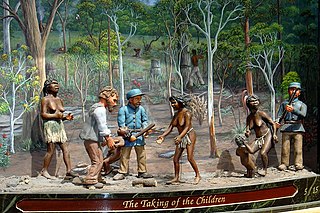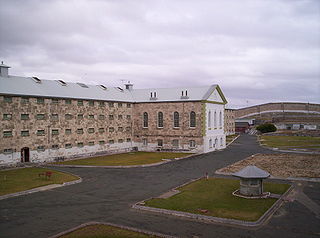Related Research Articles

The Stolen Generations were the children of Australian Aboriginal and Torres Strait Islander descent who were removed from their families by the Australian federal and state government agencies and church missions, under acts of their respective parliaments. The removals of those referred to as "half-caste" children were conducted in the period between approximately 1905 and 1967, although in some places mixed-race children were still being taken into the 1970s.

Workers' compensation or workers' comp is a form of insurance providing wage replacement and medical benefits to employees injured in the course of employment in exchange for mandatory relinquishment of the employee's right to sue his or her employer for the tort of negligence. The trade-off between assured, limited coverage and lack of recourse outside the worker compensation system is known as "the compensation bargain.” One of the problems that the compensation bargain solved is the problem of employers becoming insolvent as a result of high damage awards. The system of collective liability was created to prevent that and thus to ensure security of compensation to the workers.

A criminal record is a record of a person's criminal convictions history. The information included in a criminal record and the existence of a criminal record varies between countries and even between jurisdictions within a country. In most cases it lists all non-expunged criminal offences and may also include traffic offences such as speeding and drunk driving. In most countries a criminal record is limited to unexpunged and unexpired actual convictions, while in some it can also include arrests, charges dismissed, charges pending and charges of which the individual has been acquitted.

The Federal Insurance Contributions Act is a United States federal payroll contribution directed towards both employees and employers to fund Social Security and Medicare—federal programs that provide benefits for retirees, people with disabilities, and children of deceased workers.
A background check is a process a person or company uses to verify that an individual is who they claim to be, and this provides an opportunity to check and confirm the validity of someone's criminal record, education, employment history, and other activities from their past. The frequency, purpose, and legitimacy of background checks vary among countries, industries, and individuals. An employment background check typically takes place when someone applies for a job, but it can also happen at any time the employer deems necessary. A variety of methods are used to complete these checks including comprehensive database search and personal references.


The Rehabilitation of Offenders Act 1974 (c.53) of the UK Parliament enables some criminal convictions to be ignored after a rehabilitation period. Its purpose is that people do not have a lifelong blot on their records because of a relatively minor offence in their past. The rehabilitation period is automatically determined by the sentence. After this period, if there has been no further conviction the conviction is "spent" and, with certain exceptions, need not be disclosed by the ex-offender in any context such as when applying for a job, obtaining insurance, or in civil proceedings. A conviction for the purposes of the ROA includes a conviction issued outside Great Britain and therefore foreign convictions are eligible to receive the protection of the ROA.
Jury duty or jury service is service as a juror in a legal proceeding. Different countries have different approaches to juries. Variations include the kinds of cases tried before a jury, how many jurors hear a trial, and whether the lay person is involved in a single trial or holds a paid job similar to a judge, but without legal training.
Employment fraud is the attempt to defraud people seeking employment by giving them false hope of better employment, offering better working hours, more respectable tasks, future opportunities, or higher wages. They often advertise at the same locations as genuine employers and may ask for money in exchange for the opportunity to apply for a job.
Spent conviction legislation allows the criminal records of offenders to be amended by removing some offences after a certain period of time. The idea behind spent convictions schemes is to allow former offenders to 'wipe the slate clean' after a certain period of time, depending on the offence.
The Security Through Regularized Immigration and a Vibrant Economy Act of 2007 or STRIVE Act of 2007 is proposed United States legislation designed to address the problem of illegal immigration, introduced into the United States House of Representatives. Its supporters claim it would toughen border security, increase enforcement of and criminal penalties for illegal immigration, and establish an employment verification system to identify illegal aliens working in the United States. It would also establish new programs for both illegal aliens and new immigrant workers to achieve legal citizenship. Critics allege that the bill would turn law enforcement agencies into social welfare agencies as it would not allow CBP to detain illegal immigrants that are eligible for Z-visas and would grant amnesty to millions of illegal aliens with very few restrictions.
Social security, in Australia, refers to a system of social welfare payments provided by Australian Government to eligible Australian citizens, permanent residents, and limited international visitors. These payments are almost always administered by Centrelink, a program of Services Australia. In Australia, most payments are means tested.

The Independent Safeguarding Authority (ISA) was a non-departmental public body for England, Northern Ireland and Wales, that existed until 1 December 2012, when it merged with the Criminal Records Bureau (CRB) to form the Disclosure and Barring Service.
In Australia, domestic violence (DV) is defined by the Family Law Act 1975. Each state and territory also has its own legislation, some of which broadens the scope of that definition, and terminology varies. It has been identified as a major health and welfare issue. Family violence occurs across all ages and demographic groups, but mostly affects women and children, and at particular risk are three groups: Indigenous, young and pregnant women.
Disclosure Scotland is an executive agency of the Scottish Government, providing criminal records disclosure services for employers and voluntary sector organisations.

Punishment in Australia arises when an individual has been accused or convicted of breaking the law through the Australian criminal justice system. Australia uses prisons, as well as community corrections, When awaiting trial, prisoners may be kept in specialised remand centres or within other prisons.
The Royal Commission into Institutional Responses to Child Sexual Abuse was a royal commission announced in November 2012 and established in 2013 by the Australian government pursuant to the Royal Commissions Act 1902 to inquire into and report upon responses by institutions to instances and allegations of child sexual abuse in Australia. The establishment of the commission followed revelations of child abusers being moved from place to place instead of their abuse and crimes being reported. There were also revelations that adults failed to try to stop further acts of child abuse. The commission examined the history of abuse in educational institutions, religious groups, sporting organisations, state institutions and youth organisations. The final report of the commission was made public on 15 December 2017.

The Fair Work Act 2009(Cth) is an Act of the Parliament of Australia, passed by the Rudd government to reform the industrial relations system of Australia. It replaced the Howard government's WorkChoices legislation, it established Fair Work Australia, later renamed the Fair Work Commission.
Digital identity is used in Australia by residents to validate who they are over digital media, such as over the Internet.
Kansas v. Garcia, 589 U.S. ___ (2020), was a case of the United States Supreme Court that was decided, by a 5–4 majority, in 2020. The case concerned whether it was lawful for a State to enforce laws criminalizing the making of fraudulent representations by aliens who were not authorized to work in connection with obtaining a job; the Court held that it was.
References
- ↑ "Working With Children Check - NSW Office of the Children's Guardian".
- ↑ "Home". Department of Justice, Victoria.
- ↑ "Home". Department of Child Protection, Western Australia.
- ↑ "Blue Card Services, Department of Justice and Attorney-General". Queensland Government.
- ↑ "Home". ACT Government.
- ↑ "Access Canberra". www.accesscanberra.act.gov.au. Retrieved 2023-08-02.
- 1 2 "Working With Children Check Report". Royal Commission into Institutional Responses to Child Sexual Abuse.
- ↑ "Home". Sydney Morning Herald. 17 August 2015.
- 1 2 Budiselik, William, Frances Crawford, and Joan Squelch. "The limits of working with children cards in protecting children." Australian Social Work 62, no. 3 (2009): 339-352.
- ↑ "SA's Working With Children Checks overhauled after royal commission". ABC News. 23 August 2016.
- 1 2 Munro, Kelsey (9 July 2016). "Why parents need to be vigilant about tutors". Sydney Morning Herald.
- ↑ Child Protection (Working with Children) Act 2012.
- ↑ Child Protection (Working with Children) Regulation 2013.
- ↑ Child Protection Legislation Amendment Act 2015.
- ↑ Working with Children (Risk Management and Screening) Act 2000.
- ↑ Child Safety (Prohibited Persons) Bill 2016.
- ↑ "Role of an employer". The Children's Guardian.
- ↑ "Working with children checks should be urgently strengthened, royal commission finds". ABC News. 17 August 2015.
- ↑ "Verifying a Check - NSW Office of the Children's Guardian". www.ocg.nsw.gov.au. Archived from the original on 2017-02-26.
- ↑ Naylor, Bronwyn. "Criminal records and rehabilitation in Australia." European Journal of Probation 3, no. 1 (2011): 79-96.
- ↑ "'No, no, no!' Concern as Santas exempt from working with children checks in Queensland". Yahoo News.
- ↑ De Plevitz, Loretta. "Systemic racism: The hidden barrier to educational success for Indigenous school students." Australian Journal of Education 51, no. 1 (2007): 54-71.
- 1 2 "Working with children check backlog forces SA department to double staff, people left unable to work". ABC News. 22 April 2015. 22 Apr 2015.
- ↑ "Alleged fraudster allowed to work with kids despite sword attack". ABC News. 15 August 2016.